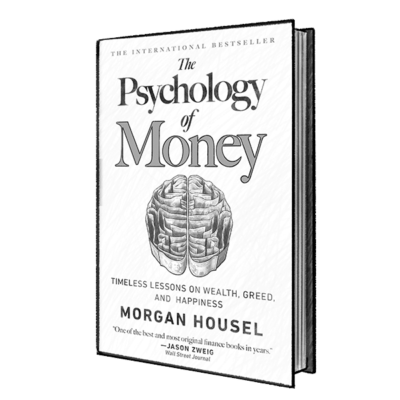Learning Lessons
12 November 2022

Hi, The Investor’s Podcast Network Community!
Surprise! 👀
Happy Saturday, before you click away, let me explain.
We’re experimenting with weekend editions of the newsletter, but these will be a lot lighter on news, and instead, aim to be more reflective.
Easy to read and relaxing sort of stuff ☕
So with that out of the way, let’s dive into our first weekend edition of We Study Markets, in just 4 minutes to read.
Do you want to write for this newsletter? Apply here.
Understand the financial markets
in just a few minutes.
Get the daily email that makes understanding the financial markets
easy and enjoyable, for free.
QUOTE OF THE DAY

“I love it when management teams of the companies I invest in own a significant amount of the stock. Why?
Because if I’m hurt as a shareholder from that company’s stock going down, I want the management team to be hurt a thousand times more than I could ever be hurt, right?
People act differently when they are owners of a company and they spend money differently…So this is why a lot of investors, myself included, like to invest in companies where the CEO is also the founder because that could mean that a substantial amount of that person’s net worth is tied to the value of that business.”
BROUGHT TO YOU BY
Do you have the right insurance for your rental property?
Get a free quote in minutes to find out how Steadily can save you time and money on your landlord insurance.
Get a quote online today at Steadily.com
THE MAIN STORY: THE SUBJECTIVITY OF MONEY AND INVESTING
Overview
Investing is not a hard science. Sure, it’s quantitative, but markets remain a complex puzzle derived from the whims of human nature.
Since almost nothing is guaranteed in investing, it’s a leap of faith for some, and today we wanted to highlight an excellent piece from Morgan Housel on just how subjective our experiences with money can be and why.
Breaking it down
He begins his explanation on a bit of a tangent by discussing how President James Garfield died during a time when the top doctors in the country didn’t understand germs.
This caused them to explore the bullet wound left by an assassin with unwashed hands that surely contributed to his death from infection.
Housel emphasizes that, despite as foreign as this reality sounds, this happened in 1881. That’s just not that long ago, but to the best 19th-century doctors, the idea that “invisible germs” could possibly be the cause of death seemed outlandish.
Other medical absurdities included the prescription of chloroform for asthma, cigarettes for hay fever, and injecting cow’s milk for tuberculosis patients.
In this respect, we’ve come so far as a civilization.
Yet, in many ways, our thinking has not evolved with money.
Timeless money problems
One hundred thirty years ago, the author William Dawson wrote, “It would seem that the anxieties of getting money only beget the more torturing anxiety of how to keep it…The man who can buy anything he covets values nothing that he buys.”
And in 1934, a lawyer wrote the following about the bubble that proceeded the Great Depression: “In normal times, the average professional man makes just a living and lives up to the limit of his income…
In times of depression, he not only fails to make a living but has no surplus capital to buy bargains in stocks and real estate. I see now how very important it is for the professional man to build up a surplus in normal times. Without it he is at the mercy of the economic winds.”

Still relevant
Housel states that this is all so relatable, almost like nothing has changed.
He says, “We’ve always been asking the same questions, dealing with the same problems, and falling for the same false solutions. We probably always will.”
While old medical journals seem laughably outdated, historic finance articles often document the same phenomenon and challenges before us today.
The point here is that in some fields, humanity’s knowledge is cumulative and passed down across generations, whereas in others, it proves more cyclical and fleeting.
Cumulative vs. cyclical knowledge
Although “there are occasional periods when society learns that debt can be dangerous, greed backfires, and more money won’t solve all your problems. But it quickly forgets and moves on. Again and again. Generation after generation…Some fields have quantifiable truths, while others are guided by vague beliefs and circumstances.”
The reality is that, due to our subjective emotion, there’s no universal formula for investing or managing your money well, as there are in physics or chemistry.
Questions about how much to save, the best investing strategy for the next decade, or the outlook for the economy do not lend themselves to scientific answers.
Takeaways
So, over the course of this century, we may find cures for cancer and heart disease, put a man on Mars, and build artificial intelligence. However, in aggregate, we’ll still be susceptive to the same financial mistakes and biases.
The pursuit of a happy life with well-managed finances at its core is dynamic and nuanced, but we do have a great history of financial mistakes to study and learn from personally, even if society at large fails to do so.
Morgan Housel’s writings and thinking have proven immensely valuable to us in this regard.
Dive deeper
Check out Housel’s full article for more.
And don’t miss our most recent interview with him or our video review of his incredible book, The Psychology of Money.
Let us know, Katrina, what do you think of our weekend edition?

SEE YOU NEXT TIME!

That’s it for today on We Study Markets!
See you later!
If you enjoyed the newsletter, keep an eye on your inbox for them on weekdays around 6pm EST, and if you have any feedback or topics you’d like us to discuss, simply respond to this email.






